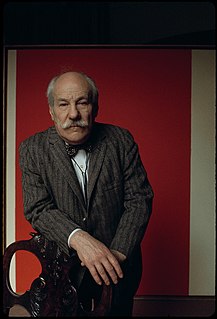Цитата Джона Стотта
Ни один человек не проповедует хорошо свою проповедь другим, если он сначала не проповедует ее своему сердцу.
Связанные цитаты
В Своих речах, Своих чудесах, Своих притчах, Своих страданиях, Своем воскресении Он постепенно воздвигает пьедестал Своего человечества перед миром, но под покровом, до тех пор, пока стрела не достигнет из могилы до небес, когда Он приподнимет завесу, и отображает фигуру человека на троне для поклонения вселенной; и облекая Свою церковь Своей собственной силой, Он уполномочивает ее крестить и проповедовать отпущение грехов во имя Его.
При отсутствии правительства каждый человек учится думать, действовать сам, не рассчитывая на поддержку внешней силы, которая, как бы бдительна она ни была, никогда не сможет удовлетворить все общественные потребности. Таким образом, человек, привыкший добиваться своего благополучия только собственными усилиями, возвышается в своем собственном мнении так же, как и в глазах других; его душа становится больше и сильнее одновременно.
Человек, дающий волю своим страстям, подобен человеку, которого застрелил враг, который поймал стрелу в свои руки, а затем вонзил ее в собственное сердце. Человек, противящийся своим страстям, подобен человеку, застреленному врагом, и хотя стрела попадает в него, она не ранит его серьезно, потому что он носит нагрудник. Но человек, искореняющий свои страсти, подобен человеку, которого пронзает враг, но который поражает стрелу и разбивает ее или обращает обратно в сердце своего врага.
Первое выражение человека, как и его первый сон, было эстетическим. Речь была скорее поэтическим возгласом, чем требованием общения. Первобытный человек, выкрикивая свои согласные, делал это в криках благоговения и гнева на свое трагическое состояние, на свое самосознание и на свою беспомощность перед пустотой.
Мудрый человек не делает ничего, кроме того, что можно сделать открыто и без фальши, и он не делает ничего такого, чем он мог бы вовлечь себя в какой-либо проступок, даже если он может остаться незамеченным. Ибо он виновен в своих глазах раньше, чем в глазах других; и публичность его преступления не приносит ему больше стыда, чем его собственное осознание этого.
Так что Бог дергает паломника за рукав, говоря ему, чтобы он помнил, что он всего лишь человек. Он должен быть сам по себе, оставаться в изгнании и принадлежать самому себе. Он должен обращать внимание на свои собственные чувства и на значение того, что он делает, если он хочет быть для себя, а также для других.
То, что человек одет в чистую белую одежду, не означает, что его сердце и руки чисты. Любой человек, пренебрегающий своей совестью, — опасное животное. Никогда не судите о человеке по его образу. Изображения могут быть куплены или созданы любым голливудским продюсером, маркетинговой командой или группой стилистов. Даже дети знают, как надеть удивительные костюмы на Хэллоуин. Всегда судите о человеке по цвету его сердца и только его сердца. Истину можно найти в его отчетах о действиях, а не о намерениях.
Если человек действительно настроит свое сердце на волю Божью, Бог научит маленького ребенка сказать этому человеку, в чем состоит Его воля. Но если человек на самом деле не желает воли Божией, даже если он идет на поиски пророка, Бог вложит в сердце пророка ответ, подобный обману в его собственном сердце.
Первое право на земле — это право эго. Первый долг человека перед самим собой. Его нравственный закон состоит в том, чтобы никогда не ставить своей главной целью личность другого. Его моральный долг состоит в том, чтобы делать то, что он хочет, при условии, что его желание не зависит прежде всего от других людей.


































